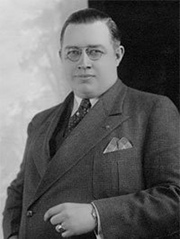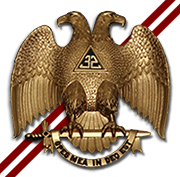

Mayor H. Roe Bartle Esq, 33°
(Jun 25, 1901-May 9, 1974)
Lebanon Lodge #87, Lebanon, Kentucky
Member, Ivanhoe Lodge #446, Kansas City, MO
Scottish Rite
1943 - 32° Consistory of Western Missouri, Kansas City
1951 - Knight Commander of the Court of Honour
1971 - Coroneted 33° Inspector General Honorary
York Rite
Member, Independence Chapter, R.A.M. No. 12, Independence, MO
Member, Palestine Cornmandery No. 17, K.T., Independence, MO
1943 - Ararat Shrine Temple
Occupation: Attorney, Mayor of Kansas City, MO., chief area executive of the Boy Scouts of America.
Established and donated land in Osceola, Missouri for Boy Scout Camp. He gained the name the Chief. During his tenure as mayor of Kansas City he
was able to facilitate the relocation of the AFL's Dallas Texans to Kansas City the year after they won the AFL championship in 1962. The Texans were named the Chiefs in honor of Roe Bartle and in 1966 won their second AFL title to play in the first AFL / NFL contest and won again to play and win the 1970 Superbowl. The Chiefs won the AFL again and ultimately their second win in 2020 Superbowl.
Interred: Forest Hill Cemetery, Kansas City, Missouri.
Mayor H. Roe Bartle was born on June 25, 1901, in Richmond, Virginia. His full name was Harold Roe Bennett Sturdevant Bartle, but he nearly always used the shortened version. After serving in the Navy in World War I, he attended law school at the University of Chattanooga. He was admitted to the Kentucky bar in 1920 and the Missouri bar in 1921. He practiced corporate law and within four years had accumulated enough savings and investments to attain a higher standard of living than his family had possessed during his childhood.
He was a member of 17 boards of directors and owned 5,000 acres in Missouri and Oklahoma. He made approximately 200 public speeches a year ranging upwards from $1,000 per speech - much of which he turned over to the American Humanities Fund of which he has been administrator since 1947.
Brother Bartle made a connection with Dr. James E. West, national chief boy scout executive, and arranged to serve as a scout executive in Wyoming. In preparation for moving to Wyoming, Bartle first came to Kansas City in 1921 for a brief training session to prepare for a one-year stint with the Scouts. Then, in 1923, Bartle moved to St. Joseph, Missouri, to join his father, a Presbyterian minister, who had relocated there. In 1928, Bartle went on to Kansas City and became the chief area executive of the Boy Scouts. He sometimes earned as much as $500 per speech in a time when the average household income in 1950 was only about $3,000. It would became his main source of income.
Brother Bartle then entered politics instead of retirement in the 1950s. At the urging of President Harry Truman, he became the regional stabilization director for the federal government in 1951. He campaigned for mayor in Kansas City in 1955 and won handily despite running as an independent instead of on the non-partisan Citizens Association or the Democratic ticket. One of his most notable actions was attracting the Dallas Texans professional football team to Kansas City. In honor of Mayor Bartle, Texans owner Lamar Hunt renamed the team the Chiefs in 1963. Mayor Bartle's tenure as mayor witnessed the arrival of the Kansas City Athletics major league baseball team, the Municipal Auditorium Plaza Garage, the Sixth Street Interchange, and additional annexations of land to Kansas City including much of what now comprises Kansas City's northland.
After completing two terms as mayor in 1963, H. Roe Bartle continued his volunteer work and speech-giving for another decade until his death on May 8, 1974. Today few people remember that the Chiefs were named after H. Roe Bartle, but his name lives on at the Bartle Hall convention center (completed in 1976), which serves as Kansas City's largest exposition hall, and at the 4200 acre H. Roe Bartle Scout Reservation in Osceola, Missouri that is home to 6,600 boy scouts each year.
He was awarded the Most Distinguished Person in Kansas City Award by the American Legion in 1939.

